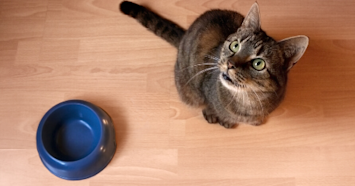
Think you know everything about feeding your cats? Many cat owners assume they know what food is best for their cat only to find out it may not be all they need. Many veterinarians keep a “kitten checklist” in every exam room. The goal of this poster is to keep them from forgetting all the points that come with a new cat’s healthcare needs. Food, especially, is an important aspect of feline healthcare.
Cats that are increasingly obese, inactive, arthritic, diabetic, and urinary tract afflicted can benefit from being fed correctly.
Dry Cat Food
The internet seems divided when it comes to the debate of dry vs wet cat food. Many people assume dry food is better for their cat due to the easy access and plethora of options. Dry food is more convenient for pet owners as well as cheaper than most other options. However, nutritional value and general quality is something that should be taken into consideration. Most cats have a hard time digesting the amount of carbohydrates in dry food and can have dehydration issues when on a solely dry diet.
Others believe dry food is best for a cat’s dental hygiene. Though dry food might still be better for getting some of that tartar off their teeth, veterinary dentists aren’t so confident about this approach to getting teeth clean. Relying on crunchy food in lieu of brushing is like expecting an apple a day to keep your dentist away.
Upshot: don’t rely on kibbled food in the dental department.
Wet Cat Food
Wet cat food or canned food can be a bit pricier than most dry food selections. However, when it comes to specific health concerns, particularly urinary tract health, cats are decidedly better off eating wet foods. Though diets formulated for “urinary tract health” abound, no independent studies exist to prove that most of these foods help treat or prevent urinary tract disease. Wet cat food has been proven to help with a wide range of health issues.
Urinary Tract Diseases
There are various solid studies that demonstrate that wet diets can help manage symptoms related to urinary tract diseases and infections. Wet diets appear to help manage kidney disease, urinary crystal formation, bladder stones, and feline idiopathic cystitis (the inflammatory condition that causes bloody urine and frequent urination).
Obesity in Cats
As to obesity: Several recent studies also indicate that feeding wet diets to cats (or even moistened kibble) can help cats lose weight. That’s because cats taking in water along with their solid foods are more active than straight-up kibble eaters.
All of which points to the fact that felines are supposed to eat wet foods. Which only makes sense. After all, wild and feral cats get most of their moisture from the animals they hunt and kill. Consequently, cats drink very little water. And since cats originally evolved in a desert environment, this adaptation to a moist diet makes perfect sense.
Now, why it would make them more active as a result hasn’t been puzzled out yet. In any case, many veterinarians recommend you consider feeding your cats a wet diet. It may be messier but is probably worth the extra effort to help your cat live a healthy, comfortable life.